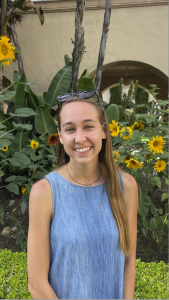
Degrees
B.S. Biochemistry, Biola University, La Mirada, 2020
Research
Emily studies lipid nanoparticle vaccines with the goal of making specific tissue-targeting vaccines.
Biography
Emily studied biochemistry in her undergraduate education but realized she had much more “chemistry” with the biology side of her degree. She originally joined UCI as a lab technician to measure human SARS CoV-2 antibody responses via protein microarray in Dr. Philip Felgner’s lab. This led to a fascination with the mRNA lipid nanoparticle vaccine formulation, from which Emily has based her new Ph.D. research project. She works on lipid nanoparticle vaccine formulations traveling to target tissues, ideally to reduce dosing and side effects while improving efficacy. When not in the lab, Emily can be found hanging out with her four pets, listening to synth rock while running, or carrying too many books out of the fiction section of one of her local libraries.
